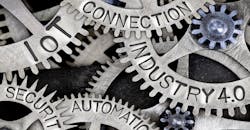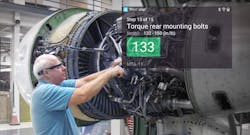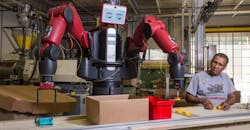How Mobility Is Fueling the Latest Tech Trends in Manufacturing
The manufacturing industry is in the midst of what many have coined as the Fourth Industrial Revolution – a digital coming-of-age for an industry with heavy roots in a low-tech era long past. The recent adoption of mobility strategies into core business operations is helping manufacturers support unprecedented business demands due to evolving customer expectations from today’s digital world, the explosion in e-commerce and advancements in IoT that are driving critical efficiencies and cost savings.
Having a strong mobility strategy is now more important than ever for manufacturers given the rise of IoT adoption, augmented reality (AR), artificial intelligence (AI) and an increasingly connected (and robotic) workforce on the factory floor.
Unprecedented Growth of IoT
The number of connected devices across industries is forecast to increase to an estimated 8.4 billion devices, up 31% from 2016. In manufacturing specifically, Verizon research recently found an 84% boost in IoT network connections between 2016 and 2017, surpassing any other industry, including transportation, energy and even healthcare, by more than 100%. In 2017 alone, the manufacturing industry invested an estimated $183 billion in IoT, again outspending both the transportation and utilities industries. In the year ahead, IoT platforms will become more and more seamless, streamlining the deployment of IoT applications, which will continue to make in-roads into the enterprise. Securely collecting, analyzing and integrating data will continue to be enterprises’ most critical concern.
This comes as no surprise as sensor data and connected manufacturing devices, which measure and analyze real time data, offer a wealth of information for control rooms – one of the main benefits being predictive maintenance or signaling future machine maintenance needs before an alarm sounds or issue arises. Predictive maintenance is crucial for maintaining schedules, reducing downtime, cutting costs and keeping production humming.
Bringing the Smart Factory to Life One Solution at a Time
Technological advancements have transformed the factory floor as we know it – and for the better. AR and AI solutions driven by mobility are gaining steam in manufacturing. These technologies are helping manufacturers with complex assembly, increased automation of the work floor and improved quality assurance. From smart glasses that overlay computer-generated video or graphics onto machinery for repairs, or factory robots that learn how to complete tasks via machine learning, it’s anticipated that AR and AI deployments will soon be accelerated across the industry. In fact, futuristic technologies are already being integrated into manufacturing floor operations. For example, a recent GE trial of smart glasses for wiring tasks found that AR headsets improved worker performance by 34% on the first use.
The introduction of robotics to manufacturing has also created new possibilities and adoption is soaring, with 1.3 million industrial robots expected to join factory workforces by 2018. These skilled robots are able to take on an increasing number of technical jobs, freeing up human workers for safer, more complex jobs on the floor. Though this has created some concerns with workforce advocates, a recent McKinsey study found that less than 5% of careers would be completely eliminated, and instead robots and humans would work side-by-side in a complementary fashion.
Powering the Factory of the Future Now
The influx of technology and automation in manufacturing has brought never-ending changes to the industry, but enterprises must ensure the correct infrastructure is in place to support these high-powered machines and devices.
On one end, mobility is fueling an emerging theme among manufacturers known as “hyper-convergence” or systems that combine mobile connectivity, compute, hybrid cloud orchestration, and security into all-in-one virtualization solutions. These hyper-converged technologies manage the endless stream of data flowing through facilities and are easy for IT teams to operate. For manufacturers to take the next step and create a customer-centric digital supply chain, they need to create systems of connectivity, compute power, servers, converged edge applications and IoT systems that link the customer to the inside of the four walls control systems to suppliers and product designers.
The future manufacturing vision will include a network of interdependent networks keeping these technologies online and connected to multiple end points – and all securely. As the manufacturing industry continues to undergo digitization, having an agile and flexible network in place is crucial for success. A network infrastructure with the capacity to support fast, secure processes - whether for robotic arms, VR headsets or tablets on the factory floor - can help protect workers, prevent delays and enable a steady stream of production. Ultimately, these network-enabled, mobile technology solutions will be instrumental in evolving an industry with a strong heritage in society and the economy, into the factory of the future.
Michael Kotelec is a global practice leader with Verizon Enterprise Solution’s manufacturing vertical practice.
About the Author
Michael Kotelec
Global Practice Leader
Michael Kotelec is a global practice leader with Verizon Enterprise Solution’s manufacturing vertical practice.



